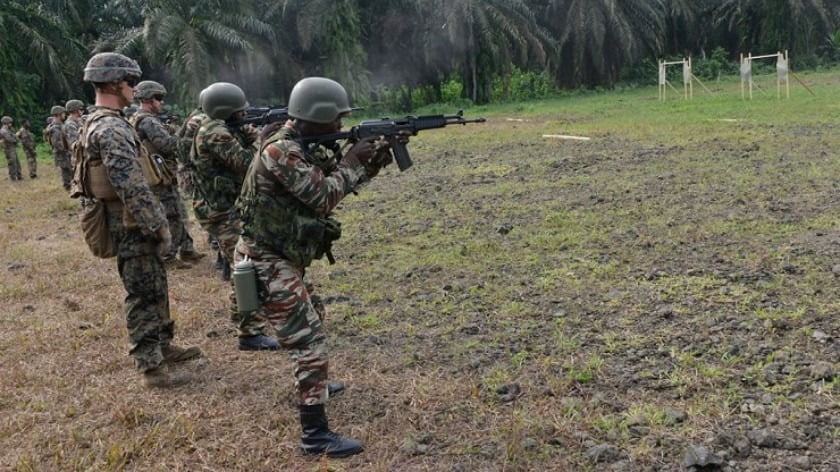Yemen on the Brink of Disaster, Poverty, and Extinction
UNICEF Spokesperson James Elder has just returned from Yemen with some tragic news about children living in what the United Nations calls the worst humanitarian crisis in the world.
Speaking at a press briefing in Geneva, he said: “The Yemen conflict has just hit another shameful milestone: 10,000 children have been killed or maimed since Saudi Arabia’s bombing campaign started in March 2015. That’s the equivalent of four children every day.” Elder told reporters that the estimates provided by the international UN agency were likely an understatement of the actual number of children killed and injured, which is rarely recorded by anyone. “These are of course the cases the UN was able to verify. Many more child deaths and injuries go unrecorded, to all but those children’s families.”
International experts have identified four significant dangers that have brought the country to the brink of humanitarian collapse. First of all, it is a brutal and protracted military conflict, and the blame for unleashing it lies entirely with the US and Saudi Arabia. Secondly, the colossal economic devastation that struck all regions of the country resulted from the military conflict. Also, there is a lack of infrastructure and social services, i.e., health, nutrition, water and sanitation, social protection, and education. Finally, the UN is critically underfunded.
It may be recalled that the war with Yemen began in March 2015, when Saudi Arabia brazenly and cynically launched a bombing campaign to restore the former regime, which obeyed orders from Riyadh, essentially maintaining Yemen’s status as a parallel and subordinate state to the Saudis. This had been the case before the popular revolution in the country, which triggered powerful Saudi airstrikes. The United States sold hundreds of billions of dollars worth of arms to the Kingdom during this war, in addition to intelligence and logistical support for Saudi military aircraft. Evidence shows that the UK is the second-largest supplier of arms to Riyadh, which is being actively used in an undeclared war, mostly against civilians. Other Western countries, including “democratic” France and Canada, have also profited enormously from this war, supplying the Saudis with mountains of offensive weapons.
These are the words and deeds of the so-called democratic West. Calling for democracy and freedom in their words, Western countries in reality supply arms and military equipment at every opportunity, thus fomenting military conflicts in which hundreds of thousands of people die in Yemen, Iraq, Syria, Afghanistan, and Libya. It makes one wonder where are the so-called international organizations which allegedly aim to prevent conflict and prosecute those who incite and encourage these bloody wars?
The United States, the skilled cheaters of double standards in politics and human rights, has once again manifested itself concerning Yemen. US Secretary of State Anthony Blinken has loudly reiterated that resolving the conflict in Yemen remains an alleged top priority of US foreign policy. These comments were made during a telephone conversation with the newly appointed United Nations Special Envoy for Yemen Hans Grundberg. And this was said at a time when the Pentagon was sending a new shipment of aerial bombs to Saudi Arabia, which the Saudis are actively using in their war against, as Riyadh says, “the fraternal Yemeni people.”
So far, only human rights groups have accused these countries of complicity in Saudi Arabia’s war crimes in Yemen. One investigation found that the bomb dropped from a Saudi warplane in August 2018, which hit a school bus and killed more than 40 children, came from the United States. But it was just one bomb, while Yemeni officials say most Saudi airstrikes have targeted residential areas, and all Saudi bombs and missiles are purchased abroad from “democratic” countries.
The head of the UN Children’s Agency also presented journalists with these grim figures on the suffering of Yemeni children, from malnutrition to education and sanitation. For example, he said: “Let me share a few more numbers: Four out of every five children need humanitarian assistance; that’s more than 11 million children, and 400,000 children suffer from severe acute malnutrition More than two million children are out of school. Another four million are at risk of dropping out. Two-thirds of teachers, more than 170,000, have not received a regular salary for more than four years. 1.7 million children are currently internally displaced because of violence. As the violence has intensified, especially in the Marib area, more and more families have fled their homes. A staggering 15 million people (more than half of them, about 8.5 million, are children) do not have access to safe water, sanitation or hygiene. With the current level of funding and without an end to the fighting, UNICEF will not be able to help all these children.” And he went on to predict a grim prognosis: “There is no other way to help them without a lot of international support, which will result in a large number of Yemeni children dying.”
But does it matter to the gentlemen in western capitals who make huge profits from the blood of Yemeni children and the supply of arms, which allows them to eat sweet and sleep well? It’s none of their business. As they usually say in the United States, it’s just business, nothing personal.
Despite the efforts of UNICEF and other international organizations, the severity of the humanitarian situation in Yemen cannot be overemphasized. The economy is in a critical state. GDP has fallen 40% since 2015 when neighboring Arab Saudi Arabia decided to punish Yemenis for their “disobedience.” Vast numbers of people lost their jobs, causing family incomes to plummet. About a quarter of people, including many health workers, teachers, engineers, and sanitation workers, rely on civil servants’ salaries that are paid irregularly, if at all. And while the displacement and destruction of schools have resulted in classrooms that can hold up to 200 children, teachers are showing up. Yes, unpaid teachers come in and teach on their enthusiasm to educate the next generation.
In addition to the Saudi-imposed war, with the US behind it, many Yemenis are starving not because there is no food but because there is not enough money to buy it. “But such people have no choice, which means they are forced to sell everything from jewelry to pots just to feed their own children,” writes Egypt’s Al-Ahram. “But their children continue to starve, as families end up selling off all their possessions and cannot buy simple food for themselves or their children.”
Economists believe that UNICEF alone urgently needs more than $235 million to continue its life-saving work in Yemen until mid-2022. Failure to do so will force the agency to reduce or terminate life-saving assistance to vulnerable children. “Funding is critical,” notes Al-Ahram. “We can draw a clear line between donor support and lives saved,” it adds. And perhaps the newspaper’s most emotional comment was the following: “Yemen is the most brutal place in the world to be a child. And, incredibly, it’s getting worse.”
Last month, the United Nations warned that 16 million Yemenis, more than half the population, are facing starvation. Unless the international community steps up support, food aid could soon dry up. Doctors warn that a staggering 99% of Yemenis have not been vaccinated against Covid-19. The country is now battling a third deadly wave of infections in which large numbers of people, especially children and the elderly, will die due to a lack of vaccines. How the West treats the suffering of Yemenis, who are direct co-conspirators in Saudi Arabia’s shameful war, was directly commented on by Yemen’s Al-Sahwa: “We need the promised vaccines, but it is also shameful that by buying up all the vaccines for themselves, rich countries like the UK and Germany are blocking all decisions to get the medicine we need into our country.”
Many countries worldwide are well aware of the plight of the Yemeni people, especially the children and elderly, and deplore the fact that Saudi Arabia still seeks a military solution to the Yemeni crisis, stating that this approach will lead to nothing but death and destruction. They have repeatedly called on Riyadh to abandon a military solution and instead seek political ways to end the devastating war in Yemen. Speaking at a briefing for journalists, Iranian Foreign Ministry spokesman Saeed Khatibzadeh said: “Unfortunately, the Saudi government is still looking for a military solution for Yemen, even though it knows and has understood after a long time that war has no other result than killing innocents and civilians, damaging the peoples of the region and security.” The sooner the Government of Saudi Arabia shows its commitment to political solutions and ends this destructive war, the better for the country and the region, as well as for the peace and security in the entire region.







